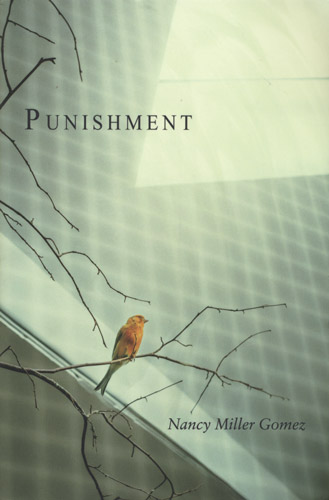Punishment
On the window sill,
in a plastic ice cream cup
a little plant is growing.
Nancy Miller Gomez’s chapbook on her time spent teaching incarcerated men to write poetry at the Salinas Valley State Prison is short . . . too short.
On the window sill,
in a plastic ice cream cup
a little plant is growing.
Nancy Miller Gomez’s chapbook on her time spent teaching incarcerated men to write poetry at the Salinas Valley State Prison is short . . . too short.
But I say this with pause and admiration, not censure.
In a time when Americans are being politically socialized to withhold empathy and draw precarious conclusions from erroneous “facts,” nothing could be more pertinent than poetry that closely examines the humanity of individuals often cast in narrowly defined roles. Such as the convict and prisoner. Hence, I want this book to be longer, keep going, give me more portraits of prison life as poignant as the ones it already presents.
In the short essay, “How Poetry Save my Live, Part One,” Gomez narrates:
Once after a writing exercise, Lorenzo shared an unexpected memory. He was driving in a car with his little sister and his mother. He was eight years old, his sister only four. His mother pulled into a parking lot and told him to wait in the car. She’d be right back. Lorenzo’s voice grew fragile and tentative as he described what it was like waiting in that car with his little sister as they grew hungry and thirsty and it began to get dark. And then he stopped reading and began to sob.
Stories live in prison cells and prisoners. That’s what Gomez discovered as she taught these men to use poetry as a survival tool to process their emotions. But, as Gomez points out in her essays and poems, teaching poetry to convicts helped save her too from the lies she had been telling for years as a reality TV show producer. “If the altered facts wouldn’t result in liability,” her executive producer had informed her, “they stayed.”
Gomez left producing and entered the realm of poetry to learn tell the truth again, and she entered the prison block to experience an honest reality.
“Fine Dining in Cell Block C” begins:
On the menu: Sweet and Sour Noodles.
The chef du jour studied at the best restaurants,
knows how to source years of street tang
and salt, the delicious hint of heat
rising off a grid on a cold day.
He can sous vide four courses with a live wire
in a trash bin. He mixes in the jelly packets
from breakfast with a butter substitute
that looks like Vaseline, presses the sweet purple
into a paste of peanut butter to create a base
for a secret sauce fermented six days
for this special dish.
What I most love about these poems is how Gomez is able to walk through walls. What I mean is she works as a translator of personhood, meshing former selves with current selves, bringing the past and present together so that the ghosts seem immediate and the immediate seems like a ghost. Gomez does not show us prisoners and convicts—the gratuitous experiences and personalities that light up a reality TV show—these are fathers, sons, cooks, artists, traumatized souls, comrades in caring for an apple seed taking root in the window sill of a cell in C block, wounded men writing poetry.
“Why does it matter,” asks the poet in “Invoking the Muse in Cell Block B,”:
if he still dreams
of nights in a cold stairwell,
pallets burning under a bridge,
the sound of his grandmother singing?
(Perhaps it matters because of the “heartache” that comes with missing those on the outside, the ones who don’t visit, family, friends, “the darkening hurt / that feels like all the colors are crushed / into the one you see shimmering / when you close your eyes,” (“Discovering Colors in Prison”).
“Do you know where I can get my kids poetry lessons?” asks Manuel in “How Poetry Saved My Life, Part Two: Poetry Lessons”: I want to share this with my children.” Imagine that. In a culture where poetry still survives in the underworld of our literary amusement, a convict wants his children to learn this art as though they would “piano” lessons or “tennis” lessons.
Perhaps we should take note from Manuel and his colleagues who:
discovered that the pain and hurt and anger they’d carried throughout their lives could be placed onto the page and shared with others. And that sharing stories cut through our differences and loneliness, connecting us in a way that mattered.
Perhaps, in our world of ready stereotypes, labels, demonization, assumption, and falsehood—all arising from emotional discontent—we would do well to turn to poetry. So turn to poetry. Even if you hate it. This very short book is a necessary read. It is accessible and includes essays, so you won’t feel overwhelmed by the language or its metaphors. This book is a beautiful testament to a poet’s journey and the incarcerated hearts that guide her through it. I sincerely hope to see these poems in a larger body of work—and to see so many more like them from Nancy Miller Gomez.





